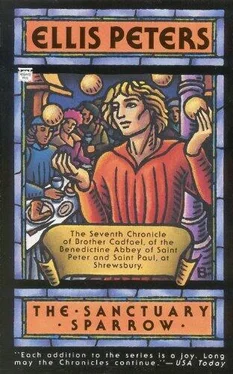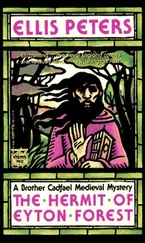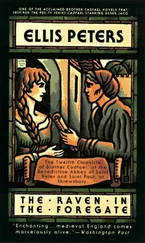Ellis Peters - The Sanctuary Sparrow
Здесь есть возможность читать онлайн «Ellis Peters - The Sanctuary Sparrow» весь текст электронной книги совершенно бесплатно (целиком полную версию без сокращений). В некоторых случаях можно слушать аудио, скачать через торрент в формате fb2 и присутствует краткое содержание. Жанр: Старинная литература, на английском языке. Описание произведения, (предисловие) а так же отзывы посетителей доступны на портале библиотеки ЛибКат.
- Название:The Sanctuary Sparrow
- Автор:
- Жанр:
- Год:неизвестен
- ISBN:нет данных
- Рейтинг книги:5 / 5. Голосов: 1
-
Избранное:Добавить в избранное
- Отзывы:
-
Ваша оценка:
- 100
- 1
- 2
- 3
- 4
- 5
The Sanctuary Sparrow: краткое содержание, описание и аннотация
Предлагаем к чтению аннотацию, описание, краткое содержание или предисловие (зависит от того, что написал сам автор книги «The Sanctuary Sparrow»). Если вы не нашли необходимую информацию о книге — напишите в комментариях, мы постараемся отыскать её.
The Sanctuary Sparrow — читать онлайн бесплатно полную книгу (весь текст) целиком
Ниже представлен текст книги, разбитый по страницам. Система сохранения места последней прочитанной страницы, позволяет с удобством читать онлайн бесплатно книгу «The Sanctuary Sparrow», без необходимости каждый раз заново искать на чём Вы остановились. Поставьте закладку, и сможете в любой момент перейти на страницу, на которой закончили чтение.
Интервал:
Закладка:
Liliwin gulped down gall, hung in anguished silence a moment, and got out in a great groan: “No!”
“You were within here yesterday, when you were sought and could not be found?”
“I didn’t want to be found. I hid myself.” His voice was firmer when he had at least a morsel of truth to utter. But Hugh pressed him still.
“You have not once set foot outside this pale since you took refuge here?”
“No, never!” he gasped, and dragged in breath as though he had run a great way.
“You hear?” said Hugh crisply, putting Liliwin aside and behind him. “You have your answer. A man penned securely here cannot have committed murder outside, even if this proves to be murder, as at this moment there is no proof whatsoever. Now go, get back to your own crafts, and leave to the law what is the law’s business. If you doubt my thoroughness, try crossing me.” And to his officers he said simply: “Clear the court of those who have no business here. I will speak with the provost later.”
In the mortuary chapel Baldwin Peche lay stripped naked, stretched now on his back, while Brother Cadfael, Hugh Beringar, Madog of the Dead-Boat and Abbot Radulfus gathered about him attentively. In the corners of his eyes, now closed, traces of ingrained mud lingered, drying, like the pigments vain women use to darken and brighten their eyes. From his thick tangle of grizzled brown hair Cadfael had coaxed out two or three strands of water crowfoot, cobweb-fine stems with frail white flowers withering into veined brown filaments as they died, and a broken twig of alder leaves. There was nothing strange in either of those. Alders clustered in many places along the riverside, and this was the season when delicate rafts of crowfoot swayed and trembled wherever there were shallows or slower water.
“Though the water where I found him,” said Cadfael, “runs fast, and will not anchor these flowers. The opposite bank I fancy, harbours them better. That is reasonable—if he launched his boat to go fishing it would be from that bank. And now see what more he has to show us.”
He cupped a palm under the dead man’s cheek, turned his face to the light, and hoisted the bearded chin. The light falling into the stretched cavities of the nostrils showed them only as shallow hollows silted solid with river mud. Cadfael inserted the stem of the alder twig into one of them, and scooped out a smooth, thick slime of fine gravel and a wisp of crowfoot embedded within it.
“So I thought, when I hefted him to empty out the water from him and got only a miserable drop or two. The drainings of mud and weed, not of a drowned man.” He inserted his fingers between the parted lips, and showed the teeth also parted, as if in a grimace of pain or a cry. Carefully he drew them wider. Tendrils of crowfoot clung in the large, crooked teeth. Those peering close could see that the mouth within was clogged completely with the debris of the river.
“Give me a small bowl,” said Cadfael, intent, and Hugh was before Madog in obeying. There was a silver saucer under the unlighted lamp on the altar, the nearest receptacle, and Abbot Radulfus made no move to demur. Cadfael eased the stiffening jaw wider, and with a probing finger drew out into the bowl a thick wad of mud and gravel, tinted with minute fragments of vegetation. “Having drawn in this, he could not draw in water. No wonder I got none out of him.” He felt gently about the dead mouth, probing out the last threads of crowfoot, fine as hairs, and set the bowl aside.
“What you are saying,” said Hugh, closely following, “is that he did not drown.”
“No, he did not drown.”
“But he did die in the river. Why else these river weeds deep in his throat?”
“True. So he died. Bear with me, I am treading as blindly as you. I need to know, like you, and like you, I must examine what we have.” Cadfael looked up at Madog, who surely knew all these signs at least as well as any other man living. “Are you with me so far?”
“I am before you,” said Madog simply. “But tread on. For a blind man you have not gone far astray.”
“Then, Father, may we now turn him again on his face, as I found him?”
Radulfus himself set his two long, muscular hands either side of the head, to steady the dead man over, and settled him gently on one cheekbone.
For all his self-indulgent habits of life, Baldwin Peche showed a strong, hale body, broad-shouldered, with thick, muscular thighs and arms. The discolorations of death were beginning to appear on him now, and they were curious enough. The broken graze behind his right ear, that was plain and eloquent, but the rest were matter for speculation.
“That was never got from any floating branch,” said Madog with certainty, “nor from being swept against a stone, either, not in that stretch of water. Up here among the islands I wouldn’t say but it might be possible, though not likely. No, that was a blow from behind, before he went into the water.”
“You are saying,” said Radulfus gravely, “that the charge of murder is justified.”
“Against someone,” said Cadfael, “yes.”
“And this man was indeed next-door neighbour to the household that was robbed, and may truly have found out something, whether he understood its meaning or not, that could shed light on that robbery?”
“It is possible. He took an interest in other men’s business,” agreed Cadfael cautiously.
“And that would certainly be a strong motive for his removal, if the guilty man got to know of it,” said the abbot, reflecting. “Then since this cannot be the work of one who was here within our walls throughout, it is strong argument in favour of the minstrel’s innocence of the first offence. And somewhere at large is the true culprit.”
If Hugh had already perceived and accepted the same logical consequence, he made no comment on it. He stood looking down at the prone body in frowning concentration. “So it would seem he was hit on the head and tossed into the river. And yet he did not drown. What he drew in, in his fight for breath—in his senses or out—was mud, gravel, weed.”
“You have seen,” said Cadfael. “He was smothered. Held down somewhere in the shallows, with his face pressed into the mud. And set afloat in the river afterwards, with the intent he should be reckoned as one more among the many drowned in Severn. A mistake! The current cast him up before the river had time to wash away all these evidences of another manner of death.”
He doubted, in fact, if they would ever have been completely washed away, however long the body had been adrift. The stems of crowfoot were very tenacious. The fine silt clung tightly where it had been inhaled in the struggle for breath. But what was more mysterious was the diffused area of bruising that spread over Peche’s back at the shoulder-blades, and the two or three deep indentations in the swollen flesh there. In the deepest the skin was broken, only a tiny lesion, as though something sharp and jagged had pierced him. Cadfael could make nothing of these marks. He memorised them and wondered.
There remained the contents of the silver bowl. Cadfael took it out to the stone basin in the middle of the garth and carefully sluiced away the fine silt, drawing aside and retaining the fragments of weed. Fine threads of crowfoot, a tiny, draggled flower, a morsel of an alder leaf. And something else, a sudden speck of colour. He picked it out and dipped it into the water to wash away the dirt that clouded it, and there it lay glistening in the palm of his hand, a mere scrap, two tiny florets, the tip of a head of flowers of a reddish purple colour, speckled at the lip with a darker purple and a torn remnant of one narrow leaf, just large enough to show a blackish spot on its green.
Читать дальшеИнтервал:
Закладка:
Похожие книги на «The Sanctuary Sparrow»
Представляем Вашему вниманию похожие книги на «The Sanctuary Sparrow» списком для выбора. Мы отобрали схожую по названию и смыслу литературу в надежде предоставить читателям больше вариантов отыскать новые, интересные, ещё непрочитанные произведения.
Обсуждение, отзывы о книге «The Sanctuary Sparrow» и просто собственные мнения читателей. Оставьте ваши комментарии, напишите, что Вы думаете о произведении, его смысле или главных героях. Укажите что конкретно понравилось, а что нет, и почему Вы так считаете.












